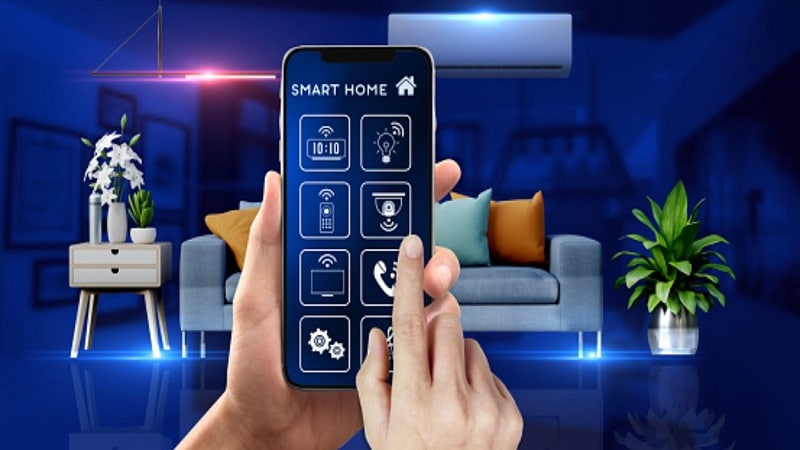
With the rise of technology and the internet of things, the home automation industry has witnessed a significant transformation over the past few years.
Smart home application development has played a significant role in this transformation, providing homeowners with a wide range of benefits, such as improved security, increased convenience, and energy efficiency.
In this article, we will discuss how home app development is revolutionizing the home automation industry.
Background
Home automation has been around for a while now, with the first home automation system being introduced in the 1970s. However, it was not until the introduction of smart home technology that home automation truly began to take off.
The integration of smart devices and mobile apps has made it easier for homeowners to control various aspects of their home, such as lighting, security, and temperature, from a single platform.
The Impact of Technology on Home Automation
Technology has been the driving force behind the transformation of the home automation industry. The integration of smart devices and mobile apps has made it possible for homeowners to control various aspects of their home remotely.
With the introduction of the internet of things (IoT), smart home devices are now capable of communicating with each other, creating a seamless and integrated system.
This has made it easier for homeowners to manage their homes, reducing the need for manual intervention.
The Role of Smart Home Application Development
Home app development has played a crucial role in the home automation industry. These apps are designed to provide homeowners with an easy-to-use interface that allows them to control various aspects of their home from a single platform.
With the integration of artificial intelligence, machine learning, and cloud computing, smart home apps are now capable of providing a personalized and intuitive experience for homeowners.
Benefits of Smart Home App Development in Home Automation
Home app development comes with a lot of great benefits. Let’s enumerate some of them.
Improved Home Security
One of the biggest benefits of smart home app development is improved home security. Smart home devices such as smart locks, security cameras, and motion sensors can be integrated into a single platform, providing homeowners with real-time updates on the security of their homes.
With the ability to remotely monitor their home, homeowners can respond quickly to any security breaches, ensuring the safety of their property and loved ones.
Energy Efficiency and Cost Savings
Another benefit of smart home apps development is energy efficiency and cost savings. With the integration of smart thermostats and lighting systems, homeowners can reduce their energy consumption and save on their utility bills.
These systems are designed to automatically adjust the temperature and lighting based on the homeowner's preferences and schedule, reducing energy waste and improving efficiency.
Increased Comfort and Convenience
Home apps development has also improved the comfort and convenience of homeowners. With the ability to remotely control various aspects of their home, homeowners can adjust the temperature, lighting, and other settings to their liking without being physically present.
This provides homeowners with a more personalized and comfortable experience, allowing them to relax and enjoy their homes to the fullest.
Remote Control and Access
Smart home apps development has also made it possible for homeowners to control various aspects of their homes remotely. With the integration of mobile apps and cloud computing, homeowners can access their home automation systems from anywhere in the world, providing greater flexibility and convenience.
Smart Home Application Development Tools and Technologies
Now, let’s talk about the tools and technologies used in home automation and app development.
Artificial Intelligence
Artificial intelligence (AI) has been a game-changer in the home automation industry. With the integration of AI, smart home apps can provide homeowners a personalized and intuitive experience. AI-powered systems can learn from the homeowner's behavior and preferences, adjusting the settings automatically to provide a more personalized experience.
Internet of Things (IoT)
The internet of things (IoT) has been another critical technology in the home automation industry. IoT-enabled devices are capable of communicating with each other, creating a seamless and integrated system. With the integration of IoT, smart home apps can access and control various devices, providing homeowners with greater control and flexibility.
Cloud Computing
Cloud computing has also played a significant role in home app development. With the integration of cloud computing, smart home apps can access and store data remotely, allowing homeowners to access their home automation systems from anywhere in the world. Cloud computing also provides greater security and scalability, ensuring the system can handle large data and users.
Machine Learning
Machine learning is another critical technology that has transformed the home automation industry. Machine learning algorithms can learn from the data generated by the smart home system, improving the accuracy and efficiency of the system over time. With the integration of machine learning, smart home apps can provide a more personalized and intelligent experience for homeowners.
Challenges and Risks of Smart Home Application Development
Despite the many benefits of home app development, there are also several challenges and risks associated with this technology.
Security Concerns
One of the biggest concerns with smart home apps development is security. With the integration of various devices and platforms, the system becomes more vulnerable to security breaches. Therefore, smart home app developers must ensure their systems are secure, and the user's data is protected.
Compatibility Issues
Another challenge with app development is compatibility issues. With so many different devices and platforms available, it can be challenging to ensure that they all work together seamlessly. Smart home app developers must ensure their systems are compatible with a wide range of devices and platforms to ensure maximum accessibility and flexibility for homeowners.
Lack of Standardization
There is also a lack of standardization in the smart home industry, with many different devices and platforms using various protocols and interfaces. This can make it challenging for homeowners to integrate devices into a single system, reducing the efficiency and convenience of the system.
Dependence on Internet Connectivity
App development also depends on internet connectivity, which can be a challenge in areas with poor internet connectivity or frequent outages. Smart home app developers must ensure that their systems can function even when the internet is unavailable, ensuring that homeowners can still control their home automation system.
Future of Smart Home Apps in Home Automation
Despite the many challenges and risks associated with smart home apps, the future of this technology looks bright.
With the integration of artificial intelligence, machine learning, and other emerging technologies, smart home apps are becoming more intelligent and intuitive, providing homeowners a more personalized and comfortable experience.
Advancements in Artificial Intelligence and Machine Learning
Artificial intelligence and machine learning are expected to play an increasingly significant role in the development of smart home apps. These technologies can learn from the homeowner's behavior and preferences, providing a more personalized and intuitive experience over time.
With AI and machine learning integration, smart home apps are expected to become more efficient, accurate, and user-friendly.
Integration with Smart Cities
The development of smart home apps is also expected to integrate with smart cities, creating a more interconnected and sustainable environment. With the integration of smart home technology into a larger smart city network, homeowners can enjoy greater accessibility, flexibility, and sustainability.
Increasing Demand for Smart Home Solutions
There is also an increasing demand for smart home solutions, with more and more homeowners recognizing the benefits of this technology. As the demand for smart home solutions grows, the industry is expected to become more competitive, leading to greater innovation and improved user experience.
Emerging Technologies and Innovations
Finally, many emerging technologies and innovations are expected to revolutionize the smart home industry in the coming years. These include virtual reality, augmented reality, and voice recognition, among others.
As these technologies continue to evolve, they are expected to provide homeowners with even greater control and convenience over their home automation systems.
Conclusion
Smart home application development is revolutionizing the home automation industry, providing homeowners with a wide range of benefits, including improved security, energy efficiency, convenience, and remote access.
The integration of artificial intelligence, machine learning, and other emerging technologies has transformed smart home apps into more personalized and intuitive systems.
However, this technology has challenges and risks, such as security concerns, compatibility issues, lack of standardization, and dependence on internet connectivity.
Despite these challenges, the future of smart home apps looks bright, with advancements in AI, machine learning, integration with smart cities, increasing demand for smart home solutions, and emerging technologies and innovations expected to drive further growth and innovation in the industry.
The development of smart home apps has the potential to revolutionize the way we live in our homes, creating a more comfortable, efficient, and sustainable environment for homeowners.










